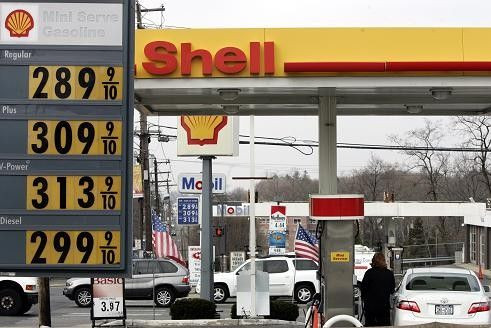Gas Prices - Five ‘Oil Shock’ Stocks
Analysis

What's the price of gas going to be in 2012?
Will regular unleaded cost $2.75 per gallon by the summer?
Or $4.75 per gallon?
Or perhaps even more?
No one really knows. There are a dozen domestic and international factors -- everything from the strength of the U.S. economic recovery, to the reform movement in Arab nations, to hurricane activity in 2012 -- that could result in a moderation in oil prices or crude testing its all-time high of $147.27 per barrel set in 2007. On Friday, oil was making yet another run at the psychologically-significant $100 per barrel mark, trading up 37 cents to $99.90 per barrel.
Meanwhile, the average price was for regular unleaded gasoline was $3.23 per gallon.
And true, it would be better if the United States had a rational, public interest-based energy policy -- even to the point of government ownership of major stakes in natural resources such as oil and natural gas -- so that decisions regarding these key energy resources are made democratically, for the benefit of the people, not the top one-tenth of one percent of society.
That won't happen any time soon, and until it does Exxon-Mobil (XOM), among other oil giants, will continue to call the tune. Big government? Big corporations are big governments -- Exxon-Mobil's market capitalization of $404 billion would make it the 26th largest country in the world.
Further, until the U.S. implements a rational energy policy, you can rage, rage against the gas pump as oil companies and refiners raise their prices every spring, or you can profit from the practice by considering an investment in an oil play. In other words, if you can't beat 'em, join 'em.
Avoid Dicey Oil Futures
Further, the view from here argues that, unless you're a very experienced investor, it's probably not prudent to dabble in the futures market to try to profit from/hedge against rising oil prices. Oil futures are influenced by many fundamental and technical variables, and unless you're prepared to lose up to $500 per day, you're probably going to be at a trading disadvantage.
What's more, the commodity markets are often referred to as zero-sum markets that frequently devastate trading programs and algorithms. Also, the difference between a monthly profit/loss can be a few percentage points -- i.e. it doesn't leave much margin for error. Bottom line: avoid futures.
Oil/Oil Services Shares: Align Your Interest with Big Oil
Instead, consider an oil/oil services stock or two. Here are five, from least to most risk.
ConocoPhillips (COP). Recent price: $71.75 per share. P/E 9. An integrated oil giant, COP looks cheap based on Thomson Reuters First Call FY2011/FY2012 forecast earnings per share of $8.67/ $8.38, which are likely to be revised higher, due to substantially higher oil and gasoline prices, and a stronger than expected U.S. economy in 2012.
Chevron (CVX). $106.31. P/E 8. It also seems impossible that a stock over $100 could be undervalued, but Chevron is, based on Thomson Reuters First Call FY2011/FY2012 forecast earnings per share of $13.55/$12.84. Chevron's 1-2% likely production growth, good cost containment, and resources for acquisitions makes Chevron a desireable play.
Valero Energy (VLO). $20.99 per share. P/E 5. Valero, the largest oil refiner in North America, has made it through the U.S. recession in decent shape. The bulk of Valero's operation involves refining the more-profitable heavy/sour crude oil, and margins will likely firmr in 2012 as U.S. gasoline demand recover.
Core Laboratories (CLB). $117.36. P/E 127.8. Core Labs is a leading reservoir optimizer, providing an impressive array of proprietary products and services for the energy sector. And, in an oil-hungry and energy-hungry world, Core's products/services are likely to continue to be in-demand. What's more, as oil fields age and as conventional oil fields become harder to find, more oil firms will look to CLB to extract more out of existing fields. With the above in mind, the Thomson Reuters First Call FY2011/FY2012 forecast earnings per share of $3.74/$4.68 look low.
Suncor Energy (SU). $28.27 per share. P/E 10.8. An oil price above $90 per barrel means there's unlikely to be interruption, for cost reasons, of Suncor's higher-cost oil sands operations, and a double-digit production increase is likely in 2012; also SU has opportunities for other growth opportunities. The Thomson Reuters First Call FY2011/FY2012 forecast earnings per share for SU are $3.17/$3.22,
Safest Pick: ConocoPhillips (COP ).
Preferred Pick (High Risk): Core Laboratories (CLB)
Of course, if the price of oil falls to $70 per barrel, the shares of the above stocks will likely drop substantially, ruining the profit from the oil game tactic.
But don't hold your breath waiting for oil prices to plunge to $70.
--
© Copyright IBTimes 2025. All rights reserved.





















